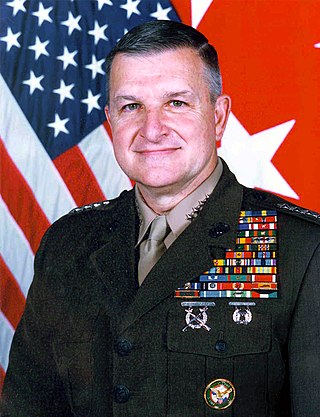
Anthony Charles Zinni is a former United States Marine Corps general and a former Commander in Chief of the United States Central Command (CENTCOM). From 2001 to 2003, he served as a special envoy for the United States to Israel and the Palestinian Authority. From 2017 to 2019, he served as a special envoy to help resolve the Qatar diplomatic crisis.

Project SHAD, an acronym for Shipboard Hazard and Defense, was part of a larger effort called Project 112, which was conducted during the 1960s. Project SHAD encompassed tests designed to identify U.S. warships' vulnerabilities to attacks with chemical agents or biological warfare agents and to develop procedures to respond to such attacks while maintaining a war-fighting capability.

Robert Burns Pirie Jr. is a retired United States Navy officer and politician. Early in 2001, Pirie served as Acting Secretary of the Navy until the nomination and confirmation of an appointee by President George W. Bush.

Henry Lawrence Garrett III served as the 68th Secretary of the Navy from May 15, 1989, to June 26, 1992, in the administration of George H. W. Bush. Before leading the Department of the Navy, he served as General Counsel of the Department of Defense.
A tombstone promotion is an advance in rank awarded at retirement. It is often an honorary promotion that does not include any corresponding increase in retired pay, whose only benefit is the right to be addressed by the higher rank and have it engraved on one's tombstone.

The Korean Airlift was a military operation during the Korean War by the United States Air Force, the Royal Canadian Air Force, and other air forces participating in the United Nations action. Beginning in 1950 under the command of Major General William H. Tunner, it provided air support to the war in Korea.

Robert Michael "Mike" Walker is the former United States Under Secretary of the Army (1997-1998).

Admiral William John Flanagan Jr. is a retired United States Navy four star admiral who served as Commander in Chief, United States Atlantic Fleet from 1994 to 1996.
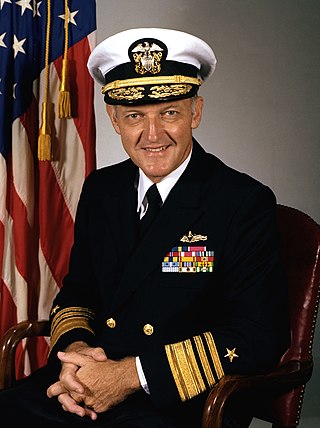
William Henry Rowden was a vice admiral in the United States Navy. He was a former commander of the United States Sixth Fleet. He also served as Deputy Chief of Naval Operations and Commander, Naval Sea Systems Command. He was a 1952 graduate of the United States Naval Academy. In retirement, he served as a director of the Naval Historical Foundation.
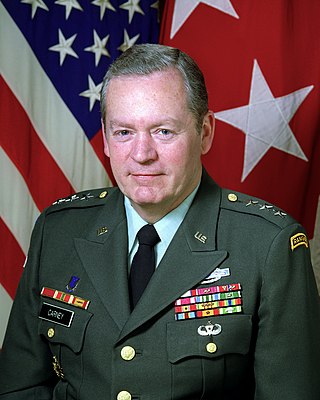
Thomas Patrick Carney was a lieutenant general in the United States Army who served as Deputy Chief of Staff G-1 Personnel of The United States Army from 1992 to 1994. Born and raised in Cleveland, he attended St. Ignatius High School and was elected president from the Class of 1959. Carney earned a B.S. degree from the United States Military Academy in 1963 and an M.S. degree in operations research from the Naval Postgraduate School in 1971. He received two Distinguished Service Medals and three awards of the Legion of Merit.

Paul Eugene Blackwell Sr. is a retired United States Army lieutenant general. During his 31-year career in the United States Army, LTG Blackwell held a wide variety of command and staff positions including assignment as Deputy Chief of Staff for Operations and Plans (G3), Department of the Army and commanding general, 24th Infantry Division (Mechanized), at Fort Stewart, Georgia. Other key assignments include Deputy Director of Operations, National Military Command Center, Washington, DC; commanding general, 2d Armored Division (Forward), Garlstedt, Federal Republic of Germany, and Assistant Division Commander, 3d Armored Division, Federal Republic of Germany.

Colonel Paul R. Shaffer (1930–1975) was a United States military aide to Iran who served as an air force pilot in both Korea and Vietnam. In 1975, he was assassinated along with Lieutenant Colonel Jack H. Turner. Vahid Afrakhteh, a founding member of Peykar, confessed to the killing and later was executed. Nevertheless, some sources have said the People's Mujahedin of Iran (MEK) was responsible.
Adara Networks is an American software company.

Vice Admiral Daniel Trantham Oliver was a United States Navy officer who rose to become Chief of Naval Personnel.
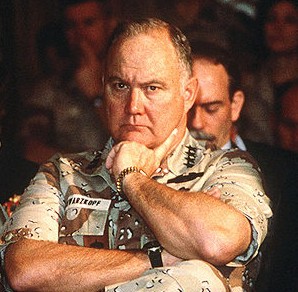
General Order No. 1 was a general order issued by General Norman Schwarzkopf Jr. to United States Central Command in the Middle East during the Gulf War. The order contains provisions restricting the behavior of troops and was intended to show respect to the laws of Saudi Arabia where many US troops were deployed. The order, for the first time in the US Army, prohibited the possession, manufacture, sale or consumption of any alcoholic beverage. It also restricted the possession of "sexually explicit" material, which was broadly defined and led to relatively innocuous documents such as underwear catalogues and bodybuilding magazines being banned. A ban on the taking of war trophies from Iraqi prisoners was later amended to permit US troops to retain captured bayonets as souvenirs. The order influenced those issued in later campaigns, many of which also include bans on alcohol consumption even where US troops are not deployed in Muslim countries.
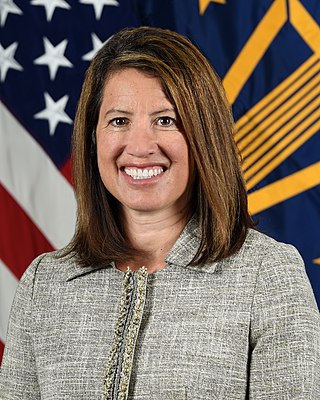
Michele A. Pearce is an American lawyer and former government official. She served as the Principal Deputy General Counsel (PDGC) of the Army from January 6, 2020 to January 19, 2021. As PDGC, Pearce was the first assistant to the General Counsel and the number two attorney in the Department of the Army. Her duties included providing legal and policy advice to the Secretary of the Army, the Secretariat, and other Army senior leaders.
Paul Burrus Benham Jr. was a state legislator from Arkansas. He was born in Memphis, Tennessee and studied at Vanderbilt University. He served as president of the Mississippi River Railway Commission.














